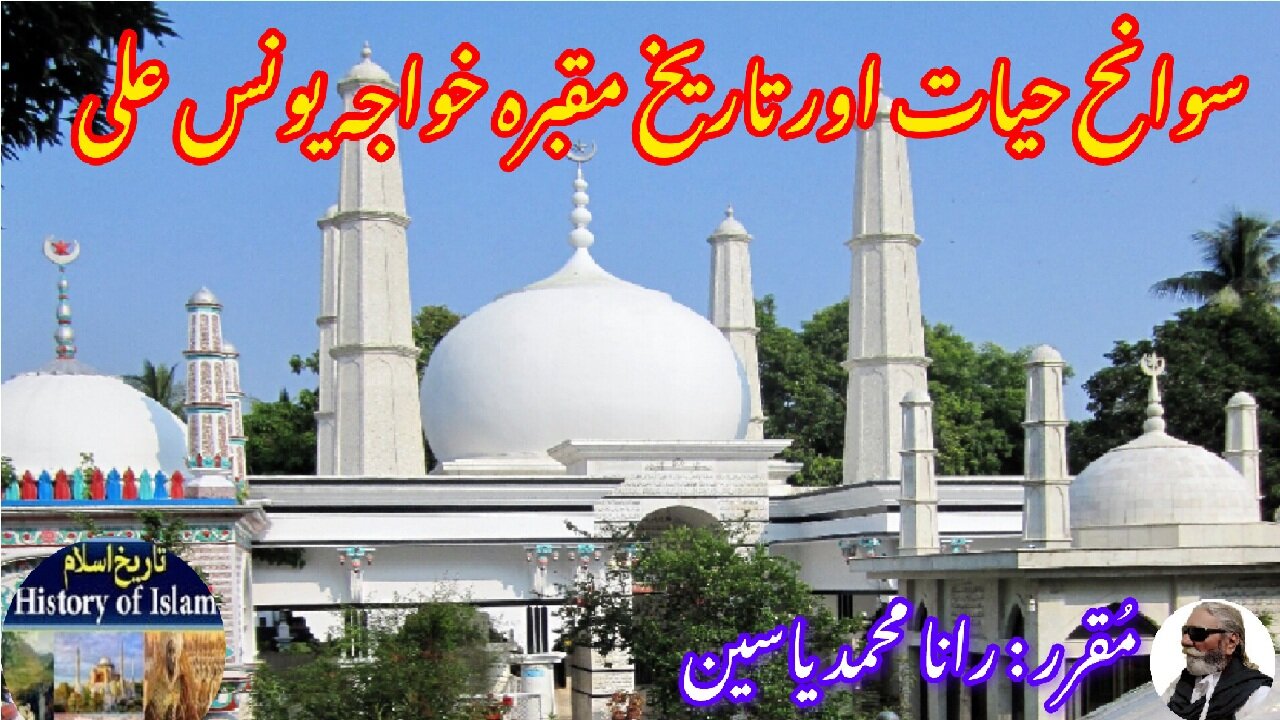Premium Only Content

Khwaja Yunus Ali and history of his shrine خواجہ یونس علی کی سوانح عمری اور ان کے مزار کی تاریخ
@islamichistory813 #sufisaint #cultural #heritage #biography #islamic #mysticism #islamic #philosophy #shrine #historical #figures
Biography of Khwaja Yunus Ali and the history of his shrine
Dekhti Aankhooon aur sountay kaanoon ko Asslamoalaikum, sisters, brothers friends and elders, in informative series videos of Islamic ascolars, sufisaints, cultural heritages, islamic philosophys, islamic mysticisms and historical figures. today we are describing biography of Khwaja Yunus Ali and the history of his shrine.
Khwaja Yunus Ali better known as Khwaja Yunus Ali Enayetpuri after his birthplace, was born in **1886** in the village of **Enayetpur**, Sirajganj (then in Pabna District, Bengal Presidency, British India; now Bangladesh). Descended from a lineage of Sayyid scholars who traced their roots back to the Prophet Muhammad through Baghdad, details of his ancestry were almost lost when the family's lineage records were destroyed in a fire in 1924. His father, Mawlana?Abdul?Karim, was a respected scholar and teacher, but he passed away when Yunus?Ali was only five years old, leaving his upbringing and spiritual formation primarily in the care of his mother and early tutors ([engrsumam.wordpress.com][2]).
From childhood, Yunus?Ali displayed an extraordinary aptitude for religious and linguistic learning. By age seven he had memorized the Qur’an and was proficient in Arabic and Persian by his teens. At seventeen, driven by a thirst for deeper knowledge, he moved to Calcutta (Kolkata) to study under Syed?Wajid?Ali for eighteen years ([iiab.me][3]). His immersions included studying Quranic exegesis, Hadith sciences, classical Sufi texts, and philosophy from luminaries like Rumi and al-Ghazali. At around nineteen, he pledged spiritual allegiance to Sheikh Syed?Wajid?Ali and spent twelve years under his mentoring, eventually receiving *khil?fat*—formal authorization—as a spiritual guide. His Shaykh honored him with the title **“Khw?ja,”** marking his entry into formal spiritual leadership ([engrsumam.wordpress.com][4]).
Khwaja?Yunus?Ali’s spiritual teachings reflected an integration of several Sufi paths—the **Naqshbandi-Mujaddidi**, **Chishti**, **Q?dir?**, and **Mujaddidiya** orders—though it was the Naqshbandi-Mujaddidi lineage that he primarily emphasized and credited with igniting the 20th-century Sufi revival in Bengal ([iiab.me][3]). His mission was to reconcile **Sharia** and **Tariqa**, balancing legalistic devotion with interior spiritual transformation. To this end, he authored two influential works: **Shariyater Alo** (*The Light of Sharia*) and **Ganj-e-Asrar** (*The City of Mystery*), advocating a harmonious relationship between outer law and inner truth ([iiab.me][3]).
Yunus?Ali’s spiritual appeal was immense. Hundreds of thousands of disciples attached themselves to him, seeking his guidance through his three-pronged teaching method: written lessons, oral lectures, and face-to-face spiritual training within a **khanqah** (Sufi lodge) ([iiab.me][3]). In **Enayetpur**, he established the **Enayetpur Darbar Sharif**, affectionately called the **Biswa Shanti Manzil** ("World Peace Centre"), which remains the largest and most influential Sufi lodge in Bangladesh ([iiab.me][3]).
Khwaja?Yunus?Ali passed away in **1951** (some sources cite 1952) in what was then East Bengal, Pakistan ([en.wikipedia.org][1]). He was laid to rest at **Enayetpur Darbar Sharif**, the khanqah he founded. His burial site, marked by his **shr?ne**, became a powerful focal point for spiritual homage and pilgrimage. The shrine was constructed under the direct supervision of his disciples and successors, who regarded Enayetpur as both sacred ground and spiritual stronghold. Even after his passing, the Ayat of his spiritual rejuvenation kept its communal radiance—especially during **Urs** celebrations when hundreds of thousands converge to offer prayers, engage in devotional recitation (*milad*), and perform **zikr-e-qulb** (remembrance of the heart) ([engrsumam.wordpress.com][4]).
Following his death, the legacy of Khwaja?Yunus?Ali lived on through a proliferation of khanqahs established by his disciples throughout Bangladesh. Most notable among these are:
* **Enayetpur Darbar Sharif** (main khanqah, founded by Khwaja himself) ([iiab.me][3]).
* **Ajadia Pak Darbar Sharif** in Sirajganj city, known as a beacon of his spiritual *silsila* ([en.wikipedia.org][1]).
* Other branches like Shambhuganj (Mymensingh), Chandrapara (Faridpur), Paradise?Para (Tangail), Murshidpur (Jamalpur), and Biswa?Zaker Manzil—all established by his devoted khalifas—continue to echo his teachings ([iiab.me][3]).
His direct lineage of spiritual leadership was upheld by his sons—**Hasim Uddin**, **Mozammel Huq**, and currently **Khwaja?Kamal?Uddin**, the **sajj?da-nashin** (spiritual successor) of Enayetpur’s lodge ([iiab.me][3]). The shrine is administered by his progeny and a cadre of senior disciples, maintaining the khanqah as both a sanctuary of spiritual guidance and a hub for social welfare.
Beyond spiritual heritage, his impact extended into education and healthcare. By 2005, the **Khwaja Yunus Ali Medical College & Hospital**, **Khwaja Yunus Ali Nursing College**, and in 2012 the **Khwaja Yunus Ali University** were all founded near the shrine by M.M. Amjad?Hussain, a disciple-genius and his son-in-law, fulfilling a vision the Saint is said to have expressed during his lifetime ([en.wikipedia.org][1]). These institutions represent his lasting ethos: spiritual upliftment anchored in societal well-being.
In sum, **Khwaja Yunus Ali Enayetpuri (1886–1951)** was a seminal figure in 20th-century South Asian Sufism. Born in **Enayetpur**, he became a master of *Sharia* and *Tariqa*, blending Islamic jurisprudence with spiritual insight and reaching hundreds of thousands. His **shrine**, the **Enayetpur Darbar Sharif**, built by his disciples, continues to draw multitudes to his tomb. With successors across Bangladesh and educational institutions bearing his name, his spiritual light endures—truly making his legacy shine as a beacon of divine knowledge and social harmony.
With this, we ask for your permission until tomorrow and pray to Allah Almighty to grant us the ability to act on the Quran and Hadith, Amen
Allah Hafiz
======================
-
 7:29
7:29
ISLAMIC HISTORY
22 hours agoYaqut Shihab al-Din ibn Abdullah al-Rumi al-Hamawi یاقوت شہاب الدین ابن عبداللہ الرومی الحماوی
13 -
 LIVE
LIVE
Total Horse Channel
14 hours agoAMHA 2025 World Show 9/26
262 watching -
 LIVE
LIVE
LFA TV
17 hours agoBREAKING NEWS ALL DAY! | FRIDAY 9/26/25
3,103 watching -
 1:25:41
1:25:41
Chicks On The Right
4 hours agoComey's FAFO moment, Dallas sniper details, DFWYF, and who to trust in media.
19.4K7 -
 DVR
DVR
Welcome to the Rebellion Podcast
17 hours ago $1.54 earnedYou Made it to FriJay - WTTR Podcast Live 9/26
16.7K -
 1:29:14
1:29:14
Game On!
18 hours ago $2.07 earnedNFL Week 4 Betting Report Preview!
20.9K3 -
 21:05
21:05
Adam Does Movies
23 hours ago $1.71 earnedAlien: Earth Episode 8 - Recap
21.6K3 -
 18:49
18:49
World2Briggs
20 hours ago $2.09 earnedTop 10 States To retire in 2026 According to Experts
24K4 -
 19:03
19:03
Blackstone Griddles
15 hours agoParmesan Ranch Chicken Sandwich oxn the Blackstone Griddle
25K3 -
 2:00:29
2:00:29
BEK TV
1 day agoTrent Loos in the Morning - 9/26/2025
23.3K